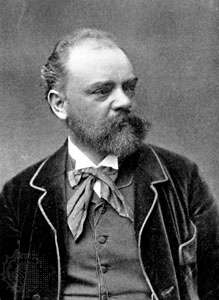Burleigh, Dvorak, and The Problem with Biographical Footnoting
I first learned of Harry T. Burleigh while reading about Antonin Dvořak. In the album notes to one of my favorite CDs, I read about Dvorak’s arrival to the States in 1892, recently hired as the music director of the National Conservatory of Music (NCM) in New York City. I read how he met Burleigh, a NCM student who performed spirituals during casual meetings at Dvorak’s home. I read that Burleigh’s performances and cultural memory served as a creative spark for two Dvorak compositions: Symphony No. 9 in E minor, “From the New World,” (1893) and String Quartet No. 12 in F major, “American” (1893), both canonical members of the orchestral and chamber music repertoires.

Antonín Dvorak
Theirs was a brief but important interaction, which has often been retold in ways that entrenches another Black composer trope: biographical footnoting. Burleigh’s knowledge and performing history prior to his NCM studies rarely figured into the Symphony No. 9 “From the New World” narrative I read and retained. While writing this entry, I realized how easily I understood Burleigh primarily in relation to Dvorak, rather than a musician whose priorities and ambitions intersected with the latter’s.
Now, this is not the case with ; and album notes should not be the only source of detailed info on a composer or performer. Yet there are narrative approaches that can present a rich and brief mention of a person who plays a role (small or large) in another person’s life. Burleigh did not attend the NCM to serve as a source of inspiration for his white teachers and fellow students. This is not a call to over-emphasize Burleigh’s role in Dvorak’s biography; it is a call for more of us to present him in the narrative as a three-dimensional person with his own agency and professional goals.
As we celebrate the 125th anniversary of Dvorak’s Symphony No. 9, I’m going to keep thinking of the ways we can tell this symphony’s story that doesn’t shortchange the breadth of Burleigh’s contribution; and ensure my own writing doesn’t lean on the trope of biographical footnoting.
Read More
Douglas Shadle, Orchestrating the Nation: The Nineteenth-Century American Symphonic Enterprise, 2016.
Douglas, Shadle,
Anne Key Simpson, Hard Trials: The Life and Music of Harry T. Burleigh, 1990.
Eileen Southern, The Music of Black Americans: A History, 3rd Edition, c. 1971, 1997.
Jean Snyder, Harry T. Burleigh: From the Spiritual to the Harlem Renaissance (2016).



